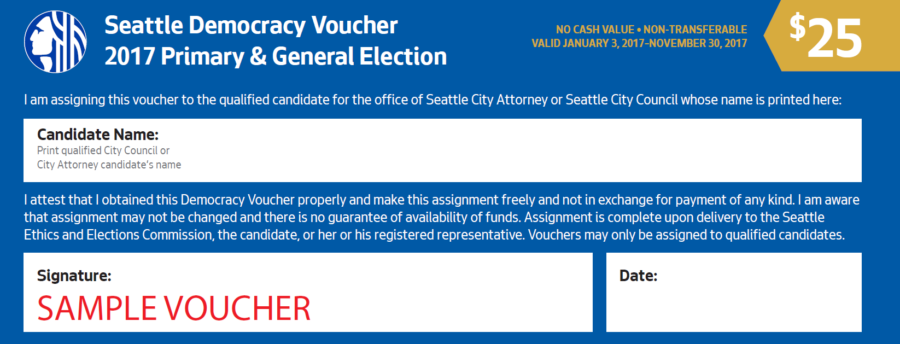Check your mailboxes, Seattle! In the next few weeks, every registered voter and eligible resident in the city will receive $100 worth of Democracy Vouchers. That means more than 500,000 Seattleites—be they bank presidents or baristas—will have $100 to support the candidates of their choice.
More than 500,000 Seattleites—be they bank presidents or baristas—will have $100 to support the candidates of their choice.
Democracy Vouchers are the groundbreaking element of Honest Elections Seattle, a public campaign finance initiative that Seattle voters passed in 2015 with a whomping 63 percent. Eligible candidates for City Council and City Attorney may finance their 2017 campaigns with Democracy Vouchers, and mayoral candidates will be able to participate in 2021.
Vouchers make just about everybody in town a political player, breaking the grip of big money and special interests on local races, and amplifying regular people’s voices in city decision-making.
In 2013, two-thirds of all money given to candidates for city office came from just 0.3 percent of Seattle adults. These donors were wealthier and whiter than the Seattle population as a whole. Democracy Vouchers mean voters finally don’t need deep pockets to have an equal voice in politics and feel heard by their representatives.
Democracy Vouchers will encourage candidates to spend more of their time talking with their constituents—in neighborhoods across the whole city—and far less time dialing for dollars from the wealthiest donors. They will also enable more people to run for office without the prerequisite ”Rolodex” of rich and powerful friends or family. More women, people of color, young people, immigrants, and people with lower incomes will find it feasible to run for office and engage with their elected officials.
We have the power to set politics on a people-powered course.
We all pay a price when money equates to access and influence in our political process; we can’t truly work on solutions to our community challenges until we fix our democracy. That’s why Cascadian cities are taking steps to restore balance to the political system. Just a few weeks ago, following Seattle’s lead, Portland City Council approved Open and Accountable Elections, a similar democracy reform initiative that allows candidates for city offices to opt in to stricter campaign finance rules, power their campaign with small-dollar donations, and receive a public match of 6-to-1 up to the first $50 of each individual campaign contribution. The Washington Government Accountability Act, a statewide democracy-reform initiative, was a comprehensive package of money-in-politics laws that lost by a small margin on the November 2016 ballot. People across Cascadia agree that money’s outsized influence in politics is out of control and that we have the power to set politics on a people-powered course.
Seattleites, keep your vouchers in a safe place and keep an eye on candidates as city campaigns pick up speed. And for the rest of Cascadia, watch out for more innovative solutions coming out of this region aimed at making sure our democracy is truly of, by, and for the people.
For more information on Democracy Vouchers, check out our research here.
[list_signup_button button_text=”Like what you|apos;re reading? Get the latest Sightline democracy research to your inbox.” form_title=”Reclaiming Our Democracy Newsletter” selected_lists='{“Reclaiming Our Democracy”:”Reclaiming Our Democracy”}’ align=”center” color=”green”]


Comments are closed.